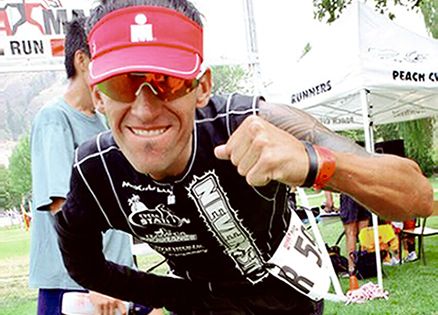Jason Lester’s award-winning athletic career almost never came to be. At the age of 12 he was struck by a speeding car that ran a red light. He ended up in the hospital with 20 broken bones and a paralyzed right arm.
But despite his inability to use his arm, and the sudden death of his father shortly after the accident, Jason miraculously found the strength to fight his way back. Refusing to give up the love of sports fostered by his father, Jason began to follow a set of principles that allowed him to recommit himself to life—and ultimately surpass goals that few dared to set.
He started training for the Ironman in 2004, and has since competed in numerous extreme races. In 2008, Jason became the first disabled athlete to complete the Ultraman (320 miles of biking, swimming, and running), and won an ESPY Award in 2009 for “Best Disabled Male Athlete.”
Here are 5 of Jason’s guidelines for success in achieving personal goals.
1. Listen to your voice.
Relentless discipline is not easy. I have to work on training every day, no matter how tempting it becomes to skip a workout or just stop altogether. But when you find your purpose, the discipline becomes easier. You already know what works for you. You already know what’s right for you.
We all have goals. We all have paths in life that call to us. We may have settled into a comfortable place where we can jam the ear buds in our ears, turn up the music and pretend we don’t hear our calling. But it doesn’t go away.
Too often people decide that they can’t have their dreams because pursuing them would take too much time, disrupt their family life, force them to quit their jobs or alienate friends who don’t understand what they’re doing. But when you feel a passion for something that keeps you awake at night and fills you with longing, you owe it to yourself to pay attention and follow the path you are called to.
Build your own laboratory. Take the first small steps toward creating an environment around yourself that will empower you to follow your dream. If your efforts lead only to modest progress, that’s much, much better than nothing.
2. Follow the spirit.
Sometimes we just can’t get out of our own way. Whether the goal is to climb Mount Everest, start a business or just graduate from high school, what stops you from having the life you dream about is not your job, your friends or the economy. In the race of life, it’s you vs. you.
Our flesh and spirit are always battling each other. The trick is learning to balance the two and knowing when to let spirit guide us. Sometimes listening to the flesh is smart, especially when your body is telling you that you need rest, peace, fuel or exercise. But when it comes to the bigger picture, spirit knows what the flesh can’t comprehend. Spirit is what enables me to run those last three miles of the race when I had nothing left in my tank.
But it’s easy to ignore spirit. We quit because we fear failure. If I fail, that means I don’t have what it takes. If triathletes did that, there wouldn’t be any triathletes! There’s hardly a racer out there who hasn’t failed at a race. The ones who are up the next morning back in the training routine are the ones who become respected, successful competitors.
3. Believe that someone’s got your back.
When the doubt and disbelief of the people around you drown out the encouragement and positive reinforcement, remember that someone’s got your back. You need a supportive environment to succeed. The love and positive attitude of loved ones and friends are a big help when you’re sticking your neck out. But remember, even though you will almost certainly find a few core folks who believe in you no matter what, you’ll likely find more doubters. When you’re pushing the envelope, that’s what happens. But all it takes is one person to have total faith in you.
Today, even with all the things I have accomplished, I often still assume that people will doubt me. Some do, but it doesn’t bother me anymore. I have my core of supporters who will always have faith in me, and that’s enough. The best I can hope for is that when I cross the next finish line, somebody in the doubter camp will find their jaw hitting the ground as they think, Wow, I was wrong about that guy. I hope the person’s next thought is, Hey, I wonder what I could do if I really put my mind to it and gave it all I had?
4. Just say yes!
It was during the Ultraman Canada that I learned a great deal about myself as a distance athlete. I learned that I needed to train my left arm and shoulder even more intensely so they would stand the strain of doing all the work in the swim. I learned that I had the endurance to get through the 6.2 mile Ultraman-length swim under the cutoff time, a major boost for my confidence. I learned that while the sight of me competing, using just one arm, was going to shock some people, there were those who loved the fact that I was out there trying and would back me all the way.
I learned all of that because I said yes to opportunity instead of wondering, “Can I?” When an opportunity presents itself, you don’t ask questions or worry, you just say yes.
5. Never stop.
We are limitless, but we set limits on what we think we can do. We base our expectations on what others tell us and on our fears of what we can’t achieve. Our inner voice can be like a terrorist whispering: “You’re not strong enough. You’re not smart enough. You’re not good enough.” Those whispers were what I heard during the first day of cycling at Ultraman Canada. We’ve all heard them. They tell us its okay to quit this time.
What they don’t tell us is that each time we give in, each time we stop before we achieve our goal, it becomes a little easier to quit the next time. The lesson that I discovered that day in the Canadian heat was that if we listen to a positive voice rather than our negative voice, we can transcend our supposed limits. Never stop.
“Never stop” means that when you set aside your fears and doubts, you find the endurance to soldier on until you achieve your goal. It means keeping your eyes on the road—left foot, right foot—and knowing that if you are doing the right things, then over time blessings will come to you. No matter what you go through, you keep pushing forward.
Jason Lester is the author of Running on Faith: The Principles, Passion, and Pursuit of a Winning Life, published by HarperOne.




